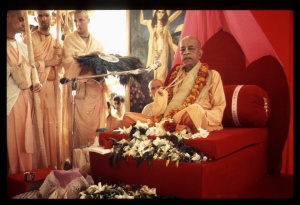BG 2.55: Difference between revisions
m (1 revision(s)) |
(Vanibot #0054 edit - transform synonyms into clickable links, which search similar occurrences (split by space character)) |
||
| (2 intermediate revisions by 2 users not shown) | |||
| Line 1: | Line 1: | ||
{{ | [[Category:Bhagavad-gita As It Is (1983+) - Chapter 02]] | ||
<div style="float:left">'''[[Bhagavad-gita As It Is (1983+)]] - [[BG 2 (1983+)|Chapter 2: Contents of the Gita Summarized]]'''</div> | |||
<div style="float:right">[[File:Go-previous.png|link=BG 2.54]] '''[[BG 2.54]] - [[BG 2.56]]''' [[File:Go-next.png|link=BG 2.56]]</div> | |||
{{CompareVersions|BG|2.55|BG 1972|BG 1983+}} | |||
{{RandomImage}} | |||
==== TEXT 55 ==== | ==== TEXT 55 ==== | ||
<div class="devanagari"> | |||
:श्रीभगवानुवाच । | |||
:प्रजहाति यदा कामान्सर्वान्पार्थ मनोगतान् । | |||
:आत्मन्येवात्मना तुष्टः स्थितप्रज्ञस्तदोच्यते ॥५५॥ | |||
</div> | |||
<div | <div class="verse"> | ||
:śrī-bhagavān uvāca | |||
:prajahāti yadā kāmān | |||
:sarvān pārtha mano-gatān | |||
:ātmany evātmanā tuṣṭaḥ | |||
:sthita-prajñas tadocyate | |||
</div> | </div> | ||
==== SYNONYMS ==== | ==== SYNONYMS ==== | ||
<div class="synonyms"> | |||
<div | ''[//vanipedia.org/wiki/Special:VaniSearch?s=śrī&tab=syno_o&ds=1 śrī]-[//vanipedia.org/wiki/Special:VaniSearch?s=bhagavān&tab=syno_o&ds=1 bhagavān] [//vanipedia.org/wiki/Special:VaniSearch?s=uvāca&tab=syno_o&ds=1 uvāca]'' — the Supreme Personality of Godhead said; ''[//vanipedia.org/wiki/Special:VaniSearch?s=prajahāti&tab=syno_o&ds=1 prajahāti]'' — gives up; ''[//vanipedia.org/wiki/Special:VaniSearch?s=yadā&tab=syno_o&ds=1 yadā]'' — when; ''[//vanipedia.org/wiki/Special:VaniSearch?s=kāmān&tab=syno_o&ds=1 kāmān]'' — desires for sense gratification; ''[//vanipedia.org/wiki/Special:VaniSearch?s=sarvān&tab=syno_o&ds=1 sarvān]'' — of all varieties; ''[//vanipedia.org/wiki/Special:VaniSearch?s=pārtha&tab=syno_o&ds=1 pārtha]'' — O son of Pṛthā; ''[//vanipedia.org/wiki/Special:VaniSearch?s=manaḥ&tab=syno_o&ds=1 manaḥ]-[//vanipedia.org/wiki/Special:VaniSearch?s=gatān&tab=syno_o&ds=1 gatān]'' — of mental concoction; ''[//vanipedia.org/wiki/Special:VaniSearch?s=ātmani&tab=syno_o&ds=1 ātmani]'' — in the pure state of the soul; ''[//vanipedia.org/wiki/Special:VaniSearch?s=eva&tab=syno_o&ds=1 eva]'' — certainly; ''[//vanipedia.org/wiki/Special:VaniSearch?s=ātmanā&tab=syno_o&ds=1 ātmanā]'' — by the purified mind; ''[//vanipedia.org/wiki/Special:VaniSearch?s=tuṣṭaḥ&tab=syno_o&ds=1 tuṣṭaḥ]'' — satisfied; ''[//vanipedia.org/wiki/Special:VaniSearch?s=sthita&tab=syno_o&ds=1 sthita]-[//vanipedia.org/wiki/Special:VaniSearch?s=prajñaḥ&tab=syno_o&ds=1 prajñaḥ]'' — transcendentally situated; ''[//vanipedia.org/wiki/Special:VaniSearch?s=tadā&tab=syno_o&ds=1 tadā]'' — at that time; ''[//vanipedia.org/wiki/Special:VaniSearch?s=ucyate&tab=syno_o&ds=1 ucyate]'' — is said. | ||
</div> | </div> | ||
==== TRANSLATION ==== | ==== TRANSLATION ==== | ||
<div class="translation"> | |||
<div | The Supreme Personality of Godhead said:O Pārtha, when a man gives up all varieties of desire for sense gratification, which arise from mental concoction, and when his mind, thus purified, finds satisfaction in the self alone, then he is said to be in pure transcendental consciousness. | ||
The Supreme Personality of Godhead said: O Pārtha, when a man gives up all varieties of desire for sense gratification, which arise from mental concoction, and when his mind, thus purified, finds satisfaction in the self alone, then he is said to be in pure transcendental consciousness. | |||
</div> | </div> | ||
==== PURPORT ==== | |||
= | <div class="purport"> | ||
The ''Bhāgavatam'' affirms that any person who is fully in Kṛṣṇa consciousness, or devotional service of the Lord, has all the good qualities of the great sages, whereas a person who is not so transcendentally situated has no good qualifications, because he is sure to be taking refuge in his own mental concoctions. Consequently, it is rightly said herein that one has to give up all kinds of sense desire manufactured by mental concoction. Artificially, such sense desires cannot be stopped. But if one is engaged in Kṛṣṇa consciousness, then, automatically, sense desires subside without extraneous efforts. Therefore, one has to engage himself in Kṛṣṇa consciousness without hesitation, for this devotional service will instantly help one onto the platform of transcendental consciousness. The highly developed soul always remains satisfied in himself by realizing himself as the eternal servitor of the Supreme Lord. Such a transcendentally situated person has no sense desires resulting from petty materialism; rather, he remains always happy in his natural position of eternally serving the Supreme Lord. | |||
</div> | |||
<div | <div style="float:right; clear:both;">[[File:Go-previous.png|link=BG 2.54]] '''[[BG 2.54]] - [[BG 2.56]]''' [[File:Go-next.png|link=BG 2.56]]</div> | ||
__NOTOC__ | |||
</div> | __NOEDITSECTION__ | ||
__NOTOC__ | |||
Latest revision as of 16:17, 17 February 2024

A.C. Bhaktivedanta Swami Prabhupada
TEXT 55
- श्रीभगवानुवाच ।
- प्रजहाति यदा कामान्सर्वान्पार्थ मनोगतान् ।
- आत्मन्येवात्मना तुष्टः स्थितप्रज्ञस्तदोच्यते ॥५५॥
- śrī-bhagavān uvāca
- prajahāti yadā kāmān
- sarvān pārtha mano-gatān
- ātmany evātmanā tuṣṭaḥ
- sthita-prajñas tadocyate
SYNONYMS
śrī-bhagavān uvāca — the Supreme Personality of Godhead said; prajahāti — gives up; yadā — when; kāmān — desires for sense gratification; sarvān — of all varieties; pārtha — O son of Pṛthā; manaḥ-gatān — of mental concoction; ātmani — in the pure state of the soul; eva — certainly; ātmanā — by the purified mind; tuṣṭaḥ — satisfied; sthita-prajñaḥ — transcendentally situated; tadā — at that time; ucyate — is said.
TRANSLATION
The Supreme Personality of Godhead said:O Pārtha, when a man gives up all varieties of desire for sense gratification, which arise from mental concoction, and when his mind, thus purified, finds satisfaction in the self alone, then he is said to be in pure transcendental consciousness.
PURPORT
The Bhāgavatam affirms that any person who is fully in Kṛṣṇa consciousness, or devotional service of the Lord, has all the good qualities of the great sages, whereas a person who is not so transcendentally situated has no good qualifications, because he is sure to be taking refuge in his own mental concoctions. Consequently, it is rightly said herein that one has to give up all kinds of sense desire manufactured by mental concoction. Artificially, such sense desires cannot be stopped. But if one is engaged in Kṛṣṇa consciousness, then, automatically, sense desires subside without extraneous efforts. Therefore, one has to engage himself in Kṛṣṇa consciousness without hesitation, for this devotional service will instantly help one onto the platform of transcendental consciousness. The highly developed soul always remains satisfied in himself by realizing himself as the eternal servitor of the Supreme Lord. Such a transcendentally situated person has no sense desires resulting from petty materialism; rather, he remains always happy in his natural position of eternally serving the Supreme Lord.